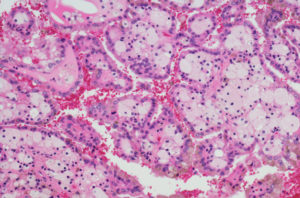
Immune checkpoint inhibitors have transformed the management of patients with advanced kidney cancer. However, these therapies only work for a subset of patients with advanced disease and can be associated with substantial side effects. As a result, researchers are focused on new therapeutic combinations to boost the effectiveness of current immune therapies in renal cancer, including in patient populations with early-stage disease that is likely to recur.
Investigators at Dana-Farber/Brigham and Women’s Cancer Center (DF/BWCC), in collaboration with investigators from the Broad Institute of MIT and Harvard, are developing a first-of-its-kind approach that combines ipilimumab (Yervoy®, an immune checkpoint inhibitor) with a personalized cancer vaccine (called “NeoVax”). The vaccine is made up of neoantigens specific to each patient’s tumor and designed to help the immune system recognize cancer cells.
This therapy is now being evaluated in a Phase I clinical trial, which aims to enroll 15 to 20 patients with high-risk disease who have already undergone surgical resection.
“We are in an exciting phase of immuno-oncology, where we are creating medications that rev up a patient’s immune system to fight off cancer,” said Steven Lee Chang, MD, MS, a surgeon in the Brigham’s Division of Urology. “But this excitement has to be tempered by the fact that many patients don’t respond. In addition, these drugs can lead to a fair degree of toxicity.
“Our aim is to find a better way to attack the disease without attacking the rest of the body, with an approach that is both more potent and safer.”
“We know that many patients with renal cell cancer will recur after surgery,” added Toni Choueiri, MD, director of the Lank Center for Genitourinary Oncology and the Kidney Cancer Center at Dana-Farber Cancer Institute. “This evolving strategy could represent a new adjuvant approach for preventing recurrence.”
Dr. Choueri is co-leading the trial along with David Braun, MD, PhD, and Patrick Ott, MD, PhD, of the Dana-Farber Cancer Institute.
A Novel Combination Approach to Immunotherapy
In the trial, patients receive five initial doses of the personalized vaccine, which targets the patients’ immune system against neoantigens found only in the tumor. They also are given injections of ipilimumab at each vaccine site in the upper and lower extremities, all of them near lymph nodes, to help take the brakes off the immune system.
The patients then receive booster doses of ipilimumab at 12 and 20 weeks. The ipilimumab is given subcutaneously rather than systemically in an attempt to avoid the autoimmune-like side effects associated with ipilimumab and other checkpoint inhibitors, such as colitis, arthritis and skin problems.
This tumor neoantigen-targeting approach is based on the laboratory work of Dana-Farber’s Catherine J. Wu, MD, and already has been tested in patients with melanoma and glioblastoma.
“For NeoVax, advanced computational methods are used to determine which neoantigens are most likely to trigger an immune response for each individual patient,” Dr. Choueiri said. “It’s important to note that this approach is not off-the-shelf. It’s extremely expensive and extremely labor-intensive. There would be challenges to scaling it up.”
Hoping to ‘Meet an Unmet Need’
For the trial, the investigators plan to enroll patients in several stages. The first, for which enrollment has already been completed, was designed primarily to evaluate toxicity from ipilimumab. Later stages will focus on dose adjustments. Dr. Choueiri said that depending on its efficacy, it may be possible to use NeoVax on its own, without ipilimumab.
“This is a population for which we don’t currently have good treatment options beyond close observation,” Dr. Chang concluded. “We can do a perfect surgery and remove every indication of disease, but these patients still have a very high recurrence risk because of the aggressive nature of their disease. This approach may prove to be an effective way to meet an unmet need.”